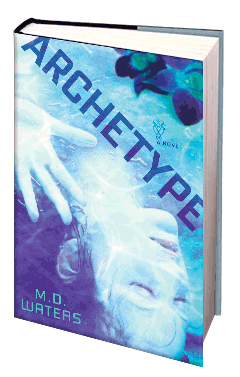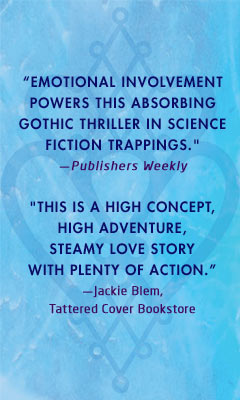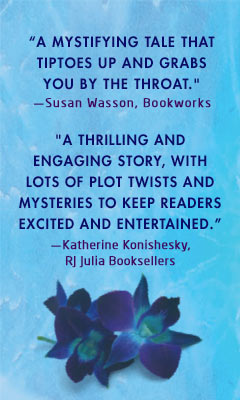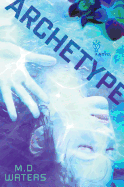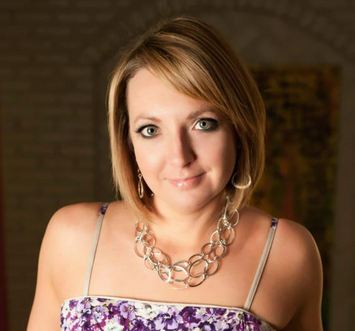Archetype
by M.D. Waters
An intriguing genre fusion, Archetype is mystery, science fiction and romance rolled into one, and signifies the start of a suspenseful new series by debut author M.D. Waters. When Emma awakens in a hospital, she has no memory of who she is. Her handsome and attentive husband, Declan Burke, is an ideal Prince Charming: a sensitive listener, seductive in the bedroom and fabulously wealthy. As Emma learns more about her husband and the world she lives in, she simultaneously experiences flashbacks that tell a very different story from the one Declan is telling her. Soon Emma finds herself struggling to make sense of her memories, of her past life, and whether she is actually married to someone else entirely--a man who is now intent upon killing her.
The setting of Archetype is a futuristic dystopia, a North America torn asunder in a bitter civil war between the totalitarian East and the rebellious West. Medical technologies have advanced to do what was once thought impossible, and teleportation is a mode of transport. Luxurious conveniences whisper and whisk about the rooms to make life effortlessly comfortable for the wealthy. Declan is even able to gift Emma with an artist's dream--a studio that uses holographic technology to take on the appearance of any setting in the world she might wish to paint.
It is, moreover, a world that echoes Margaret Atwood's The Handmaid's Tale, resulting from the combined effects of a shortage of females and a decrease in women's fertility, turning fecund women into a prized commodity. Most women are infertile and therefore assigned jobs suited to their inferior status, and are destined to perpetual singlehood. Meanwhile, in order to exploit the value of fertile women, girls in the East are placed in "Women's Training Camps" (WTCs) to prepare them for marriage, obedience and childbearing; they are subsequently sold to the highest bidder. Birth control and abortion are illegal--a fact that looms threateningly over Emma even in the midst of her marital bliss. Some inner voice is whispering to her that having a baby with Declan would be a bad idea--that he is a bad idea.
But who is the mysterious woman in her thoughts? Why does "She"--as Emma calls her--keep showing Emma images of a beach, of combat, of a brutal murder in a WTC? As the book progresses and Emma witnesses more and more "memories" that come together like the pieces of a puzzle, she faces an increasingly urgent dilemma: whether to stay in a marriage that seems perfect, or risk all by attempting to find out the truth.
The title Archetype has a double meaning in this narrative: there is on the one hand the science fiction meaning of the term, which is revealed at the end, when Emma discovers the root of her identity. On the other hand, the title can also refer to the archetype that the sinister Dr. Travista, the technological wizard behind the mystery, is attempting to create in Emma--that of Virginia Woolf's "Angel in the House," the perfect wife. The Women's Training Camps begin the work that Dr. Travista attempts to complete in Emma, encouraging only "feminine" qualities such as domestic contentment, subservience, the desire for children and--above all--total reliance upon her husband. Anything that might make Emma independent is inherently threatening--she lives under what is essentially house arrest. Any time she shows signs of rebelling against these conditions, she is returned to the hospital for treatments and tests. That she has no idea what is being done to her, and at first has no memories of anything that took place months before, makes the situation all the more macabre.
In contrast, the "She" of Emma's flashbacks is an experienced fighter, ruthlessly independent even when in love, and given to biting irony. Thus Emma finds herself torn between the archetype she is being conditioned to become, and the compelling voice of a strong woman--and she has no idea which is real.
Elements of romance come into play early on, when Emma experiences all the bloom of first love with Declan, her husband, as she regains consciousness. The conflict between the two women within her--the obedient wife and the fighter--is exemplified in two men, Declan and Noah Tucker; she believes the latter might have been her true husband all along. A suspenseful plot drives Emma's emotional conflict and sexual tension with these two men, though it is not as simple as choosing between them: while Declan loves Emma and wishes to be married to her, Noah may never have been her husband at all. How can Emma give up a perfect life, married to a devoted and wealthy man, for the sake of a life that may have never been hers and is surely gone? --Ilana Teitelbaum



